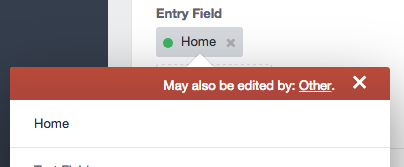marionnewlevant / snitch
Report when two people might be editing the same element (eg entry, category, or global) or field
Installs: 84 958
Dependents: 2
Suggesters: 0
Security: 0
Stars: 35
Watchers: 3
Forks: 15
Open Issues: 6
Type:craft-plugin
pkg:composer/marionnewlevant/snitch
Requires
- craftcms/cms: ^3.5.0
README
Snitch watches element editors (entry, category, global set, user, etc.) and field editors, and lets you know when someone else may also be editing the same thing at the same time.
Installation
To install Snitch, follow these steps:
- Install with Composer via
composer require marionnewlevant/snitchfrom your project directory - Install plugin in the Craft Control Panel under Settings > Plugins
or
- Install via the Plugin Store
Snitch works on Craft 3.x.
Snitch Overview
Snitch works by injecting a javascript file into backend pages. That javascript looks for an element edit window or a modal element edit window, and when it detects one, asks the server to report any collisions.
A warning banner appears at the top of the editor pane when someone else may be editing the same element:
A warning banner also appears at the top of editor modals:
Clicking the X will dismiss the banner.
Configuring Snitch
The default configuration can be overridden with a config file in craft/config/snitch.php. This is a standard Craft config file, with the usual multienvironment support. The configurable values are:
serverPollInterval: interval (in seconds) for polling server to look for newly arrived conflicts. Default value:2. Minimum value 1, maximum value 5.messageTemplate: text for the warning banner. This is parsed as twig, withuserthe user who may be in conflict. Default value is:May also be edited by: <a href="mailto:{{user.email}}">{{user.username}}</a>.. This will generate amailtolink to the user. You can change this to enable Slack messaging, or what-have-you.elementInputIdSelector: the css selector for identifying the hidden inputs which indicate an element edit window or modal element edit window.fieldInputIdSelector: css selector for identifying the hidden inputs which indicate a field edit window.
The visual look of the warning banners can be modifed with the cpcss plugin.
How it works.
Javascript (and css) is added to every backend page. That javascript fetches the configuration values, and then starts polling. Every 2 seconds, it looks for any edit forms on the page, and if it finds such a form, reports via ajax the type and the id of the element that the edit form is editing. In return, it is passed a list of possible collisions.
On the server, a database table (snitch_collisions) records
- the user
- the type of the element being edited
- the id of the element being edited
- when the element was last reported being edited by this user.
When the ajax call arrives reporting that an element is being edited, these things happen:
- Any report that has not been updated in 10 poll intervals is removed from the snitch_collisions table. It is no longer being edited.
- Either create a new report for this user/element type/element id, or update the time on the existing one
- Look for any edit reports of this element by other users.
- Return the user data from these reports. These will be other people who may be editing the element.
Issues
Snitch will fail to notice when one person is editing a Commerce product, and another is editing a variant of that product through a modal.
Brought to you by Marion Newlevant


